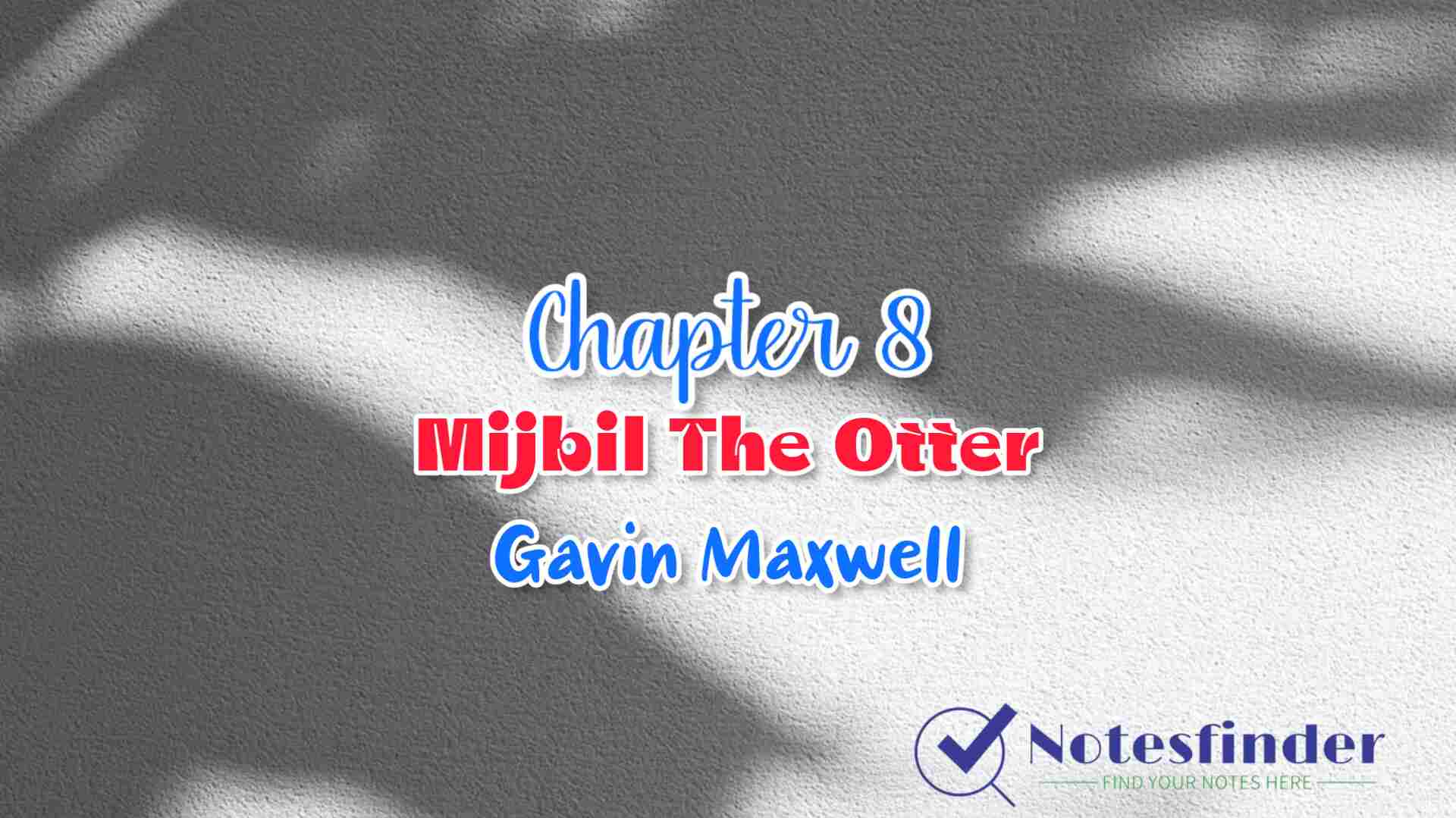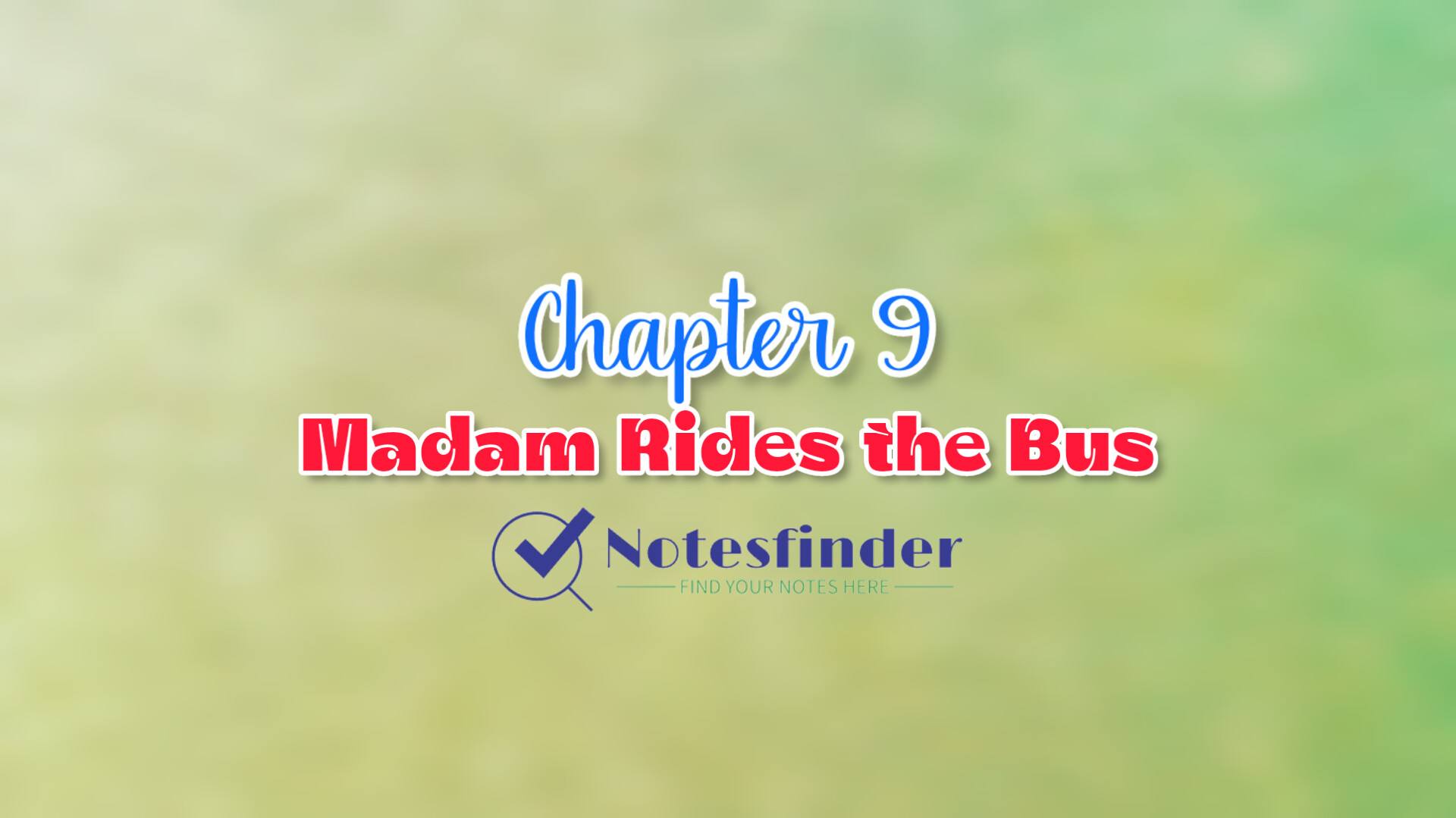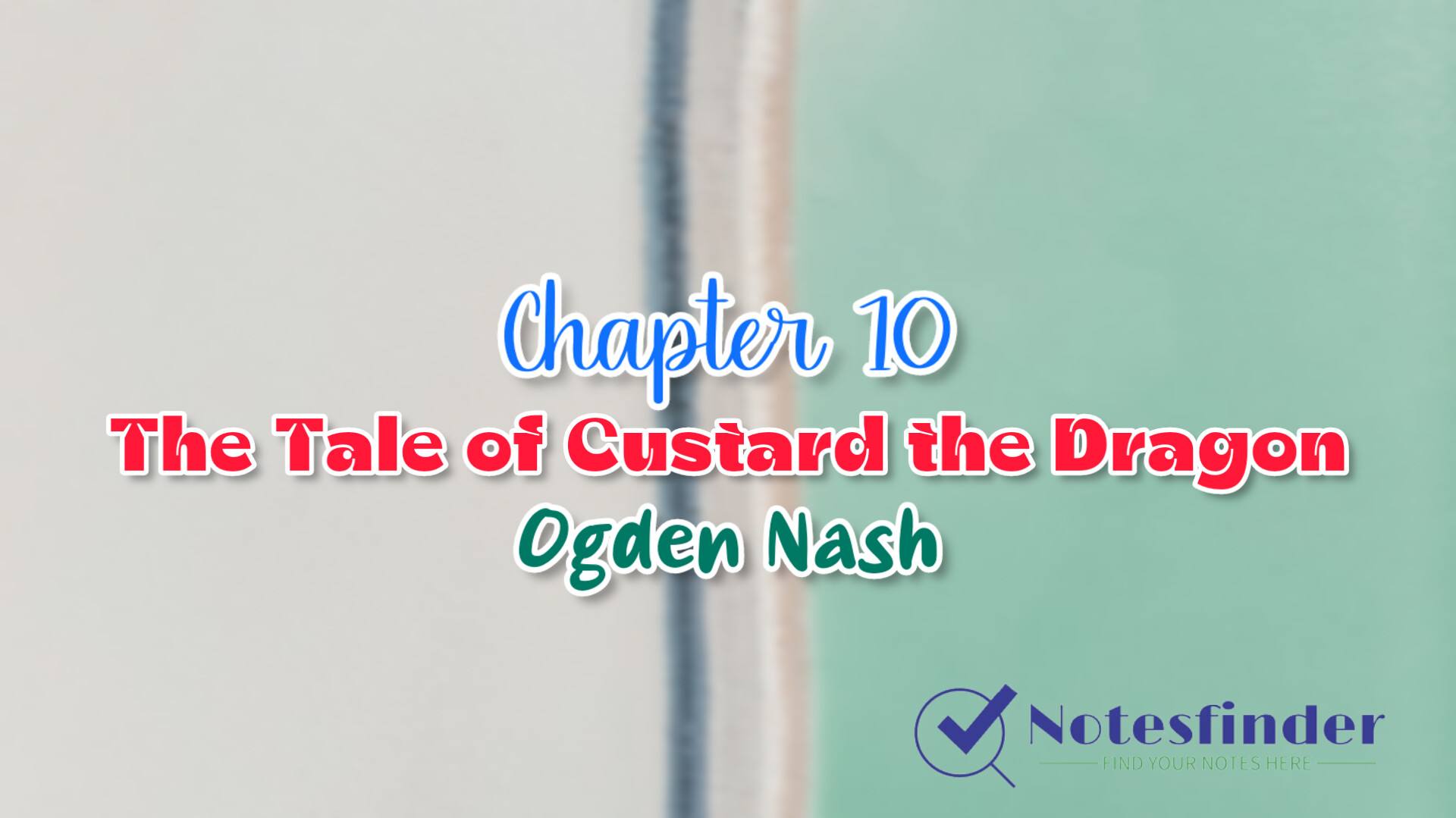NCERT Solutions for Class 10 English First Flight Chapter 8 Mijbil the Otter
Oral Comprehension Check(Page 106)
1. What ‘experiment’ did Maxwell think Camusfearna would be suitable for?
Answer: Maxwell had gone to Southern Iraq in the year 1956. He took a fancy to the idea that instead of keeping a dog as a pet, he would go for an otter. He thought Camusfearna was surrounded by water that was a stone’s throw, so it would be a suitable spot for this experiment.
2. Why does he go to Basra? How long does he wait there, and why?
Answer: The writer went to Basra to collect and answer his mail from Europe.
He had to wait there for 5 days as his mail was delivered five days later.
3. How does he get the otter? Does he like it? Pick out the words that tell you this.
Answer: His friend bought the otter for him and sent it to the place where he was staying.
Yes, the author liked it. This is seen in “The second night Mijbil came on to my bed in the small hours and remained asleep in the crook of my knees….” “ I made a body-belt for him…”.
4. Why was the otter named ‘Maxwell’s otter’?
Answer: An otter was typically called by zoologists as Lutrogale Perspicillata Maxwelli. So, it was called Maxwell’s otter in short.
5. Tick the right answer. In the beginning, the otter was
(i) aloof and indifferent
(ii) friendly
(iii) hostile
Answer: In the beginning, the otter was (i) aloof and indifferent.
6. What happened when Maxwell took Mijbil to the bathroom? What did it do two days after that?
Answer: When the author first took Mijbil to the bathroom, the otter plunged and rolled in it. He jumped up and down the length of the bathtub. He made enough slosh and splash.
After two days, the otter suddenly disappeared from Maxwell’s bathroom and went to the bathroom to play in the water and opened the tap on his own.
Oral Comprehension Check (Page 108,109)
1. How was Mijbil transported to England?
Answer: Mijbil was packed in an eighteen inches box as the British airlines did not allow pets on board. The author had to book a ticket on a different airline to Paris and then Paris to London.
2. What did Mij do to the box?
Answer: The box was lined with a metal sheet. Mij didn’t feel comfortable inside the box and tried to escape. In his attempt to escape, Mij tore into the metal lining of the box and in the process hurt himself and started bleeding.
3. Why did Maxwell put the otter back in the box? How do you think he felt when he did this?
Answer: As there was no other way to carry Mij to London, Maxwell put it in the box again. He must have felt pity and worried as the otter hurt himself while trying to escape from the box.
4. Why does Maxwell say the airhostess was “the very queen of her kind”?
Answer: The airhostess was very sympathetic after listening to Maxwell’s story. She understood how he might be feeling and then gave him permission to take the otter out of the box and keep his pet on his knee. Maxwell developed a profound admiration for her and referred her as “the very queen of her kind”.
5. What happened when the box was opened?
Answer: As soon as the box was opened, Mij ran out of the box and ran all over the place scaring all the passengers. It created a claos and most of the people in the plane got scared.
Oral Comprehension Check (Page 110)
1. What game had Mij invented?
Answer: Mij invented a game of playing with the ping-pong ball in a unique way. One of the author’s suitcase was damaged and had a slope on the top part. Mij would put the ball on the high end and run to catch it as it slided down to the lower end.
2. What are ‘compulsive habits’? What does Maxwell say are the compulsive habits of
(i) school children
(ii) Mij?
Answer: Compulsive habits are usually strange act or behaviour which a person does without clear reason. For example, a kid jumping over a fence, instead of going through the passage way.
(i) As per this story, children must place their feet squarely on the centre of each paving block; must touch every seventh upright of the iron railings, or pass to the outside of every second lamp post.
(ii) Mijbil while on its way to home would jump over the boundary wall railing and run at full speed throughout its length.
3. What group of animals do otters belong to?
Answer: Otters belong to a comparatively small group of animals called Mustellines. The other animals of this group are badger, mongoose, weasel, stoat, mink and others.
4. What guesses did the Londoners make about what Mij was?
Answer: Londoners made the wildest possible guesses about Mij. Their guesses ranged from a baby seal, a squirrel, a walrus, a beaver, a bear cub, a leopard, a hippo to a brontosaurus.
Thinking about the Text (Page 110, 111)
1. What things does Mij do which tell you that he is an intelligent, friendly and fun-loving animal who needs love?
Answer: Mij invented his own game out of ping-pong ball and a worn down suitcase. He opened the tap in the bathroom tub and played with water. He clung to Maxwell’s feet in the flight. He had gradually formed a special bond with Maxwell.
2. What are some of the things we come to know about otters from this text?
Answer: Otters belong to a comparatively small group of animals called Mustellines, shared by badger, mongoose, weasel, stoat, mink and others. They are found in large numbers in marshes. Arabs tame them as pets. Otters love to spread water and splash in it. Otters are intelligent, friendly and fun- loving.
3. Why is Mij’s species now known to the world as Maxwell’s otter?
Answer: Maxwell’s otter was of a race previously unknown to science and was at length named by zoologists Lutrogale Perspicillata Maxwelli. Hence, it is known as Maxwell’s otter in short.
4. Maxwell in the story speaks for the otter, Mij. He tells us what the otter feels and thinks on different occasions. Given below are some things the otter does. Complete the column on the right to say what Maxwell says about what Mij feels and thinks.
Answer:
| What Mij does | What Mij Feels or thinks |
| Plunges, rolls in the water and makes the water splosh and splash | He thinks it is a hippo and is very happy. |
| Screws the tap in the wrong way | He chitters with irritation and disappointment |
| Nuzzles Maxwell’s face and neck in the aeroplane | He feels much comfort and content after its distressed chitter. |
5. Read the story and find the sentences where Maxwell describes his pet otter. Then choose and arrange your sentences to illustrate those statements below that you think are true.
Maxwell’s description
(i) makes Mij seem almost human, like a small boy.
(ii) shows that he is often irritated with what Mij does.
(iii) shows that he is often surprised by what Mij does.
(iv) of Mij’s antics is comical.
(v) shows that he observes the antics of Mij very carefully.
(vi) shows that he thinks Mij is a very ordinary otter.
(vii) shows that he thinks the otter is very unusual.
Answer:
(i) True
“He spent most of his time in play. ”
(ii) False
(iii) True
“I watched, amazed; in less than a minute he had turned the tap far enough to produce a trickle of water, and after a moment or two achieved the full flow.”
(iv) True
Marbles were Mij’s favourite ” toys for this pastime: he would lie on his back rolling two or more of them up and down his wide, flat belly without ever dropping one to the floor.
(v) True
“A suitcase that I had taken to Iraq had become damaged on the journey t the lid, when closed, remained at a slope from one end to the other. Mij discovered that if he placed the ball on the high end it would run down the length of the suitcase. He would dash around to the other end to ambush its arrival, hide from it, crouch to spring up and take it by surprise, grab it and trot off with it to the high end once more.
(vi) False
(vii)True
“It is not, I suppose, in any way strange that the average Londoner as to what kind of animal this might be came as a surprise to me.”
Thinking about Language (Page 111)
II. Noun Modifiers
1. Look at these examples from the text, and say whether the modifiers (in italics) are nouns, proper nouns or adjective plus noun.
(i) An offer fixation
(ii) The iron railings
(iii) The Tigris marshes
(iv) The London streets
(v) Soft velvet fur
(vi) A four- footed soccer player
Answer:
(i) Noun
(ii) Noun
(iii) Proper noun
(iv) Proper noun
(v) Adjective plus noun
(vi) Adjective plus noun
2. Given below are some nouns and a set of modifiers (in the box). Combine the nouns and modifiers to make as many appropriate phrases as you can. (Hint: The nouns and modifiers are all from the texts in this book.)
| 1. Temple | Stone temple, white temple |
| 2. Gifts | Ordinary gift, birthday gift. |
| 3. Time | First time, family time, college time |
| 4. Crossing | Railroad crossing, first crossing |
| 5. Physique | Plump physique, ordinary physique |
| 6. Girls | Incorrigible girls, plump girls, college girls |
| 7. Thoughts | Uncomfortable thoughts, ridiculous thoughts, ordinary thoughts, good thoughts, invigorating thoughts |
| 8. Scream | Loud scream, heartbreaking scream |
| 9. subject | Uncomfortable subject |
| 10. fight | First flight, ordinary flight, uncomfortable flight |
| 11. Coffee | Black coffee, ordinary coffee |
| 12. farewell | Tremendous farewell, college farewell |
| 13.Landscape | Rough landscape, bare landscape |
| 14.Chatterbox | Incorrigible chatterbox, ridiculous chatterbox |
| 15. View | Panoramic view, ordinary view |
| 16. Dresses | Ordinary dresses, birthday dresses, marriage dresses |
| 17.Handkerchief | White handkerchief, clean handkerchief |
| 18. Profession | Family profession, first profession |
| 19. Celebration | Birthday celebration, tremendous celebration |
| 20. Roar | Loud roar, tremendous roar |
III.
1. Match the words on the left with a word on the right. Some words on the left can go with more than one word on the right.
(i) A portion of — blood
(ii) A pool of — cotton
(iii) Flakes of — stones
(iv) A huge heap of — gold
(v) A gust of — fried fish
(vi) Little drops of — snow
(vii) A piece of — water
(viii) A pot of — wind
Answer:
(i) A portion of fried fish
(ii) A pool of water
(iii) Flakes of snow
(iv) A huge heap of stones,
(v) A gust of wind
(vi) Little drops of blood, Little drop of water
(vii) A piece of cotton, A piece of fried fish
(viii) A pot of gold
2. Use a bit of/a piece of/a bunch of/a lump of/a cloud of with the italicised nouns in the following sentences. The first has been done for you as an example.
(i) My teacher gave me some advice.
(ii) Can you give me some clay please?
(iii) The information you gave was very useful.
(iv) Because of these factories, smoke hangs over the city.
(v) Two stones rubbed together can produce sparks of fire.
(vi) He gave me some flowers on my birthday.
Answer:
(i) My teacher gave me a bit of advice.
(ii) Can you give me a lump of clay please?
(iii) The bit of information you gave was very useful.
(iv) Because of, these factories, a cloud of smoke hangs over the city.
(v) Two pieces of stone rubbed together can produce sparks of fire.
(vi) He gave me a bunch of flowers on my birthday.



